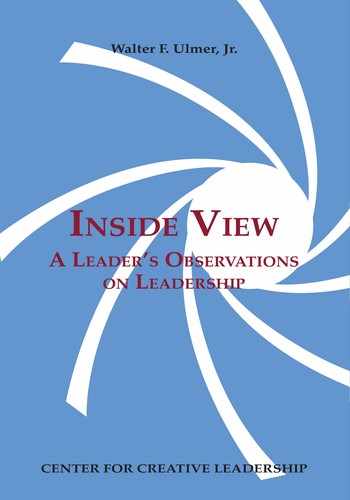The very idea of change is threatening. Everything biological and historical argues against our embracing something different. It took people a long time to come to grips with the round earth and the heliocentric motions of the local planets—even though these conceptual revisions hardly affected the life of the typical fifteenth-century worker.
Projecting, thinking about, and reacting to changes in technological and societal circumstances has become a hallmark of our times. “White water forever” is the rallying cry of many who study and write about future organizational environments. Given the convincing arguments that change is inevitable on most fronts, that it is necessary if we are to grow and learn and improve, and that there is no escaping it, it would seem to follow that we leaders of organizations would need no further urging to confront “change.” But that doesn’t seem to be the case.
Advice about the necessity for growth and change might be more palatable if it were presented indirectly. Perhaps we could craft some questions for leaders of large, complex organizations—especially those organizations with relatively strong cultures and a recent record of success—that wouldn’t get the defensive juices flowing. (Relatively robust, successful, and confident organizations may well be the most likely to experience incremental, unobtrusive deterioration.)
Maybe we could instigate organizational introspection with some of the following questions, hoping they would be a catalyst for opening a wider discussion about the perils of satisfaction with the status quo:
Is there an even more reliable and motivational method of evaluating individual and group productivity within your company than the innovative systems you are now using? (In fact, all too few systems are in harmony with company values and priorities; and outmoded performance-appraisal methods that encourage competitiveness instead of cooperation are endemic to contemporary American organizations.)
Can you enhance your in-place programs for reallocating authority and responsibility within your organization so that you further optimize the contributions of everybody in the workforce? (The control-versus-commitment paradigm which is at the heart of total quality management and other highly visible movements represents the single biggest challenge to true implementation of “quality” programs. Generating the mutual trust and respect between organizational layers and among departments requires more creativity, more personal risk-taking, and greater change from a comfortable hierarchical managerial orientation than most of us are willing to give.)
Does your system of selecting the right people for promotion—as good as it is—do everything it should for your organization? (The high percentage of managers who are promoted and then are seen to fail should be viewed as a national disgrace. Something is missing, including reliable definitions of “success” and “failure.” Evaluation of candidates from multiple perspectives—not just from the perspective of the boss—might be a powerful part of the solution. Opportunities for monitored development on the job after structured feedback should help. But the true criteria for promotion remain unclear in almost all organizations.)
Can you improve your procedures for studying and analyzing your frequent successes and occasional failures so that your organization can learn even more quickly from its collective experience? (Case studies in the business-school format might be too elaborate or too simplistic, and mostly they are very late on the scene. We are uncomfortable revealing what really happened, to include the bad decisions of our bosses, in a systematic and useful form. Discussions in the board room and around the CEO’s table rarely have the collection of facts and frustrations needed to isolate systemic defects and to promote constructive learning from success and failure.)
I doubt if some recent campaign organizations would have found these questions useful. If there is leadership at the top that operates independently of inputs from peers and subordinates, posing these questions would be a waste of time. Of course it is true that if the top person has access to all the data, possesses the requisite cognitive ability, has the full range of pertinent experience, and retains a completely robust personality, these questions would be impertinent and irrelevant. But there are such a very few of us around …
[Originally published in Issues & Observations, Vol. 12, No. 4, 1992]
